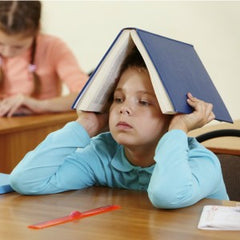
Fidgeting in Children
 Kids with attention deficit hyperactivity disorder usually fidget, but new research indicates intense fidgeting might really help them concentrate on the job at hand. In case the research bears out, the standard advice to motivate these kids to sit still can be misguided, said lead researcher Julie Schweitzer, a professor of psychiatry and behavioural sciences in the HEAD Institute of the University of California, Davis. Generally, it is suggested that kids remain still and not be tumultuous, Schweitzer said. In her little study evaluating 26 kids with ADHD and 18 without the disorder, she discovered that whenever the kids with ADHD were moving or fidget more intensely, they performed better on a test needing attention.
Kids with attention deficit hyperactivity disorder usually fidget, but new research indicates intense fidgeting might really help them concentrate on the job at hand. In case the research bears out, the standard advice to motivate these kids to sit still can be misguided, said lead researcher Julie Schweitzer, a professor of psychiatry and behavioural sciences in the HEAD Institute of the University of California, Davis. Generally, it is suggested that kids remain still and not be tumultuous, Schweitzer said. In her little study evaluating 26 kids with ADHD and 18 without the disorder, she discovered that whenever the kids with ADHD were moving or fidget more intensely, they performed better on a test needing attention.
What Causes Fidgeting in Children?
The movements of the kids without ADHD didn't affect test performance. The study was published on-line June 11 in the journal Child Neuropsychology. What I suspect is that children with ADHD are moving to improve their attention by activating their excitation system, Schweitzer supposed. Being aroused does increase attention. The kids all done the same test, which needed them to focus as well as to dismiss distractions. The kids were asked to look for the way of the middle arrow in some arrows. They required to dismiss the arrows surrounding the center one. The intensity of motion, but not its consistency, was connected with more right answers in the children with ADHD.
Nevertheless, the research didn't prove cause and impact of fidgeting in children, only a link or affiliation. The kids in the research ranged in age from 10 to 17, and were 14 on average. Fifteen of the kids with ADHD took stimulant medicine, but stopped it for twenty four hours before the testing. Almost six million kids in the US have an analysis of ADHD, in accordance with the U.S. CDC and Prevention. Hyperactivity is a core symptom and probably the most observable hallmarks of the disorder, in accordance with the researchers. The inability to sit still may cause problems in school settings. Other symptoms include impulsiveness and an inability to pay attention.
The theory of how unrest could help those with ADHD continues to be long talked about, said Brandon Korman, chief of neuropsychology in Nicklaus Childrens Hospital in Miami. He believes the new research is among the first reports to test the theory. One restriction of the finding was the little number of kids who were involved, he said. Korman also doesn't think the results suggest fidgeting is always acceptable for these kids.
Leave a comment
Comments will be approved before showing up.



